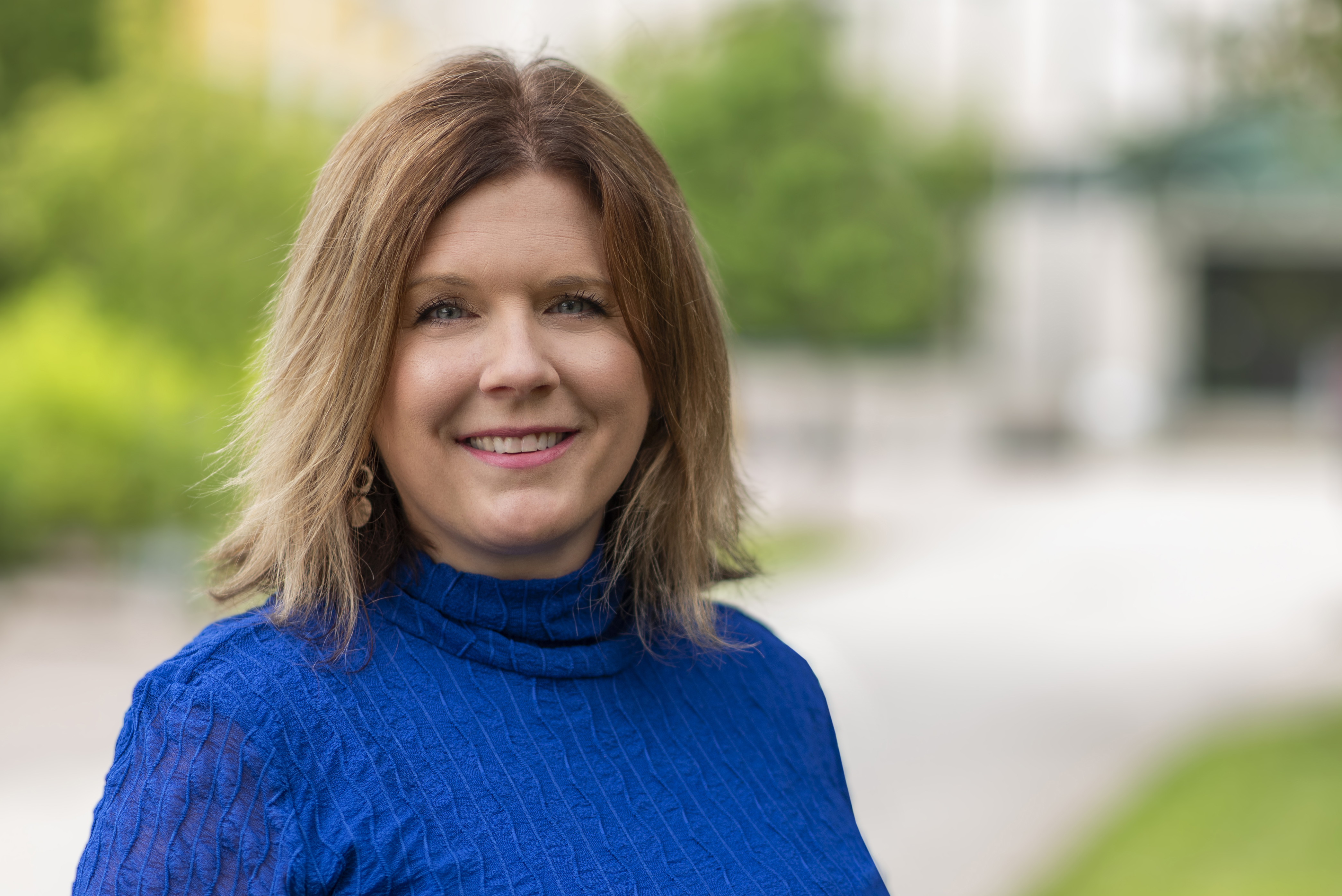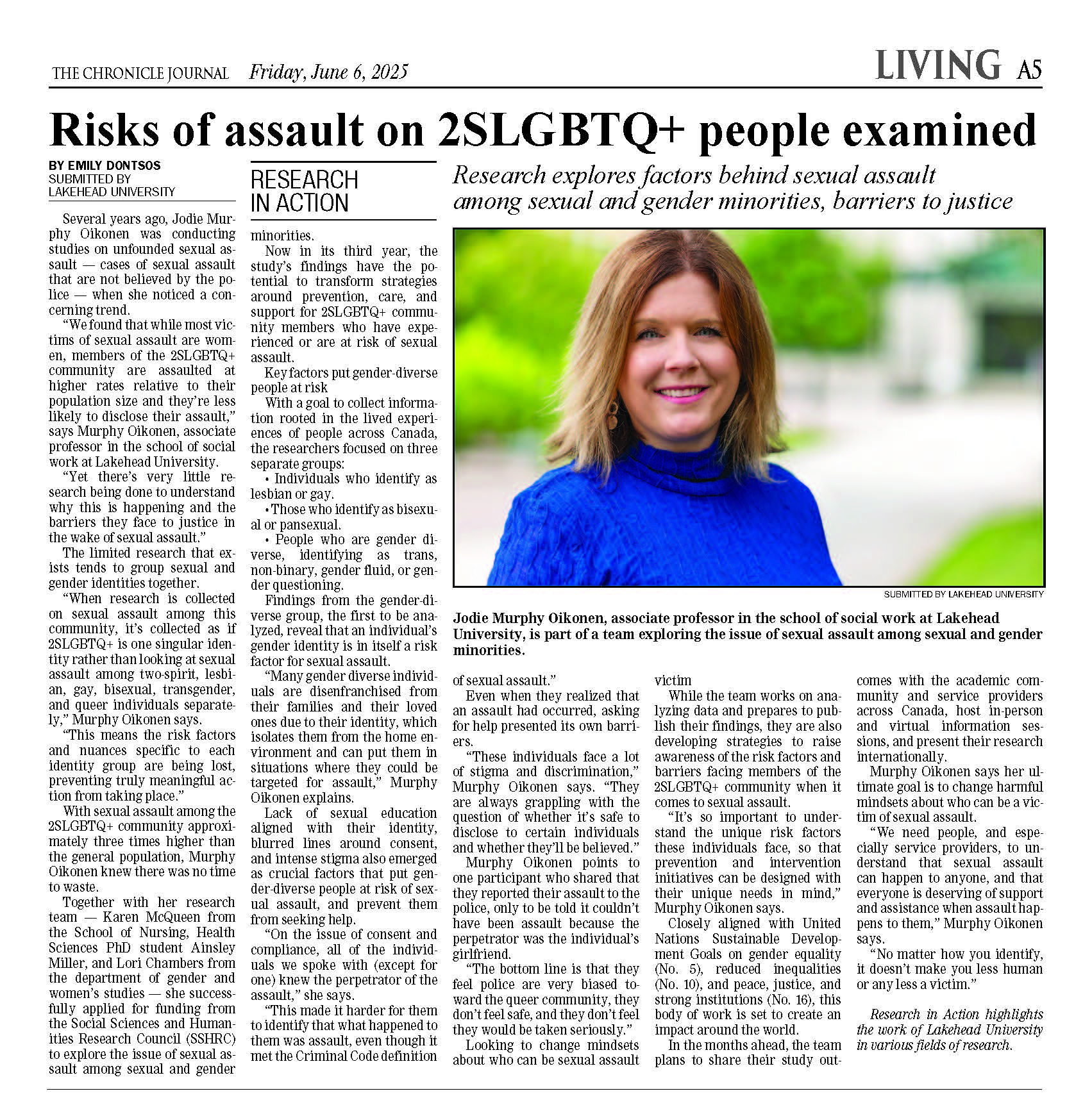Research in Action: Risks of Assault on 2SLGBTQ+ people examined
Originally posted in The Chronicle Journal on June 6, 2025.
By EMILY DONTSOS
Several years ago, Dr. Jodie Murphy Oikonen was conducting a series of studies on unfounded sexual assault—cases of sexual assault that are not believed by the police—when she noticed a concerning trend. 
“We found that while most victims of sexual assault are women, members of the 2SLGBTQ+ community are assaulted at higher rates relative to their population size and they’re less likely to disclose their assault. Yet there’s very little research being done to understand why this is happening and the barriers they face to justice in the wake of sexual assault,” says Dr. Murphy Oikonen, Associate Professor in the School of Social Work at Lakehead University.
The limited research that exists tends to group sexual and gender identities together.
“When research is collected on sexual assault among this community, it’s collected as if 2SLGBTQ+ is one singular identity rather than looking at sexual assault among two-spirit, lesbian, gay, bisexual, transgender, and queer individuals separately,” says Dr. Murphy Oikonen.
“This means the risk factors and nuances specific to each identity group are being lost, preventing truly meaningful action from taking place.”
With sexual assault among the 2SLGBTQ+ community approximately three times higher than the general population, Dr. Murphy Oikonen knew there was no time to waste.
Together with her research team—Dr. Karen McQueen from the School of Nursing, Health Sciences PhD student Ainsley Miller, and Dr. Lori Chambers from the Department of Gender and Women’s Studies—she successfully applied for funding from the Social Sciences and Humanities Research Council (SSHRC) to explore the issue of sexual assault among sexual and gender minorities.
Now in its third year, the study’s findings have the potential to transform strategies around prevention, care, and support for 2SLGBTQ+ community members who have experienced or are at risk of sexual assault.
Findings highlight issues of identity, consent, and stigma
With a goal to collect information rooted in the lived experiences of people across Canada, the researchers focused on three separate groups: individuals who identify as lesbian or gay, those who identify as bisexual or pansexual, and people who are gender diverse, identifying as trans, non-binary, gender fluid, or gender questioning.
Findings from the gender-diverse group, the first to be analyzed, reveal that an individual’s gender identity is in itself a risk factor for sexual assault.
“Many gender diverse individuals are disenfranchised from their families and their loved ones due to their identity, which isolates them from the home environment and can put them in situations where they could be targeted for assault,” Dr. Murphy Oikonen explains.
Lack of sexual education aligned with their identity, blurred lines around consent, and intense stigma also emerged as crucial factors that put gender-diverse people at risk of sexual assault—and prevent them from seeking help.
“On the issue of consent and compliance, all of the individuals we spoke with (except for one) knew the perpetrator of the assault,” she says. “This made it harder for them to identify that what happened to them was assault, even though it met the Criminal Code definition of sexual assault.”
Even when they realized that an assault had occurred, asking for help presented its own barriers.
“These individuals face a lot of stigma and discrimination,” Dr. Murphy Oikonen says. “They are always grappling with the question of whether it’s safe to disclose to certain individuals and whether they’ll be believed.”
Dr. Murphy Oikonen points to one participant who shared that they reported their assault to the police, only to be told it couldn’t have been assault because the perpetrator was the individual’s girlfriend.
“The bottom line is that they feel police are very biased toward the queer community, they don’t feel safe, and they don’t feel they would be taken seriously.”
Working toward a future of equity and justice for all
While the team works on analyzing data and prepares to publish their findings, they are also developing strategies to raise awareness of the risk factors and barriers facing members of the 2SLGBTQ+ community when it comes to sexual assault.
“It’s so important to understand the unique risk factors these individuals face, so that prevention and intervention initiatives can be designed with their unique needs in mind,” Dr. Murphy Oikonen says.
Closely aligned with United Nations Sustainable Development Goals on gender equality (#5), reduced inequalities (#10), and peace, justice, and strong institutions (#16), this body of work is set to create an impact around the world.
In the months ahead, the team plans to share their study outcomes with the academic community and service providers across Canada, host in-person and virtual information sessions, and present their research internationally.
Dr. Murphy Oikonen says her ultimate goal is to change harmful mindsets about who can be a victim of sexual assault.
“We need people, and especially service providers, to understand that sexual assault can happen to anyone, and that everyone is deserving of support and assistance when assault happens to them. No matter how you identify, it doesn’t make you less human or any less a victim.”
Research in Action highlights the work of Lakehead University in various fields of research.


